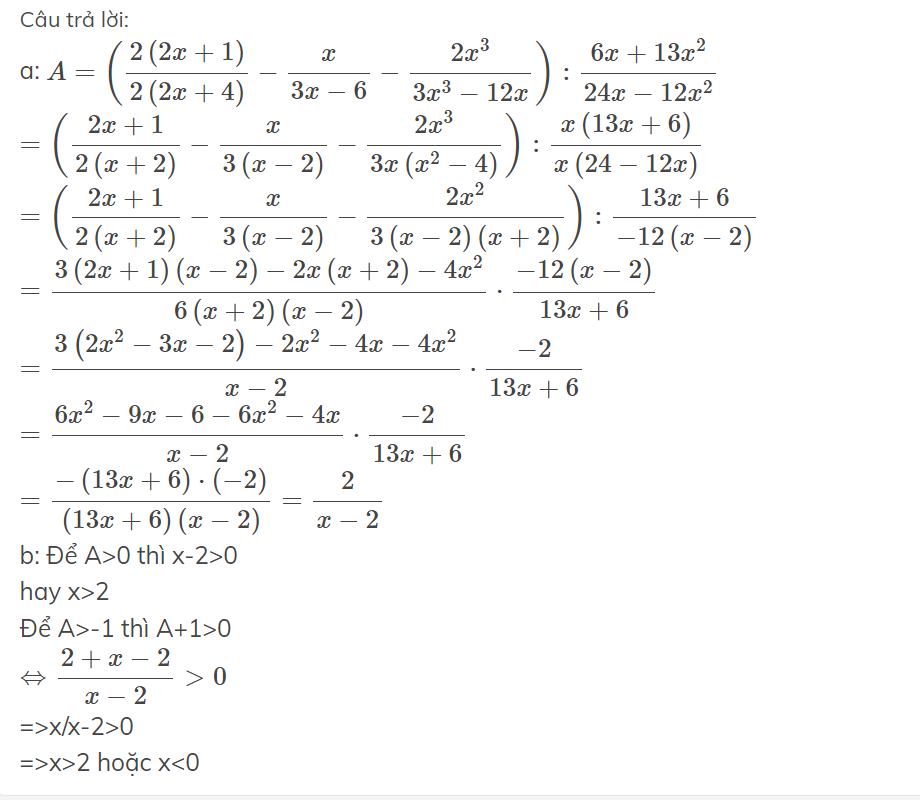
Hãy nhập câu hỏi của bạn vào đây, nếu là tài khoản VIP, bạn sẽ được ưu tiên trả lời.


\(\Rightarrow\left(\frac{x+1}{9}+1\right)+\left(\frac{x+2}{8}+1\right)=\left(\frac{x+3}{7}+1\right)+\left(\frac{x+4}{6}+1\right)\)
\(\Rightarrow\frac{x+10}{9}+\frac{x+10}{8}=\frac{x+10}{7}+\frac{x+10}{6}\)
\(\Rightarrow\frac{x+10}{9}+\frac{x+10}{8}-\frac{x+10}{7}-\frac{x+10}{6}=0\)
\(\Rightarrow\left(x+10\right).\left(\frac{1}{9}+\frac{1}{8}-\frac{1}{7}-\frac{1}{6}\right)=0\)
\(\Rightarrow x+10=0\Rightarrow x=-10\)

sai đề rồi nha...bạn thay dấu suy ra thành dấu tương đương giùm mik..mik bị nhầm
\(\frac{x+5}{65}+\frac{x+10}{60}=\frac{x+15}{35}+\frac{x+20}{50}\)
\(\Rightarrow\frac{x+5}{65}+\frac{x+10}{60}-\frac{x+15}{55}-\frac{x+20}{50}+2-2=0\)
\(\Rightarrow\left(\frac{x+5}{65}+1\right)+\left(\frac{x+10}{60}+1\right)-\left(\frac{x+15}{55}+1\right)-\left(\frac{x+20}{50}+1\right)=0\\ \)
\(\Rightarrow\left(\frac{x+5}{65}+\frac{65}{65}\right)+\left(\frac{x+10}{60}+\frac{60}{60}\right)-\left(\frac{x+15}{55}+\frac{55}{55}\right)-\left(\frac{x+20}{50}+\frac{50}{50}\right)=0\)
\(\Rightarrow\frac{x+70}{65}+\frac{x+70}{60}-\frac{x+70}{55}-\frac{x+70}{50}=0\)
\(\Rightarrow\left(x+70\right)\left(\frac{1}{65}+\frac{1}{60}-\frac{1}{55}-\frac{1}{50}\right)=0\)
\(\Rightarrow x+70=0\left(\frac{1}{65}+\frac{1}{60}-\frac{1}{55}-\frac{1}{50}\nè0\right)\)
\(\Leftrightarrow x=-70\)
học tốt...............nhớ k cho mik nha

a) ta có :x2+2x+2=(x+1)2+1>0,với mọi x
x2+2x+3=(x+1)2+2>0,với mọi x
ĐKXĐ:x\(\in\)R.Đặt x2+2x+2=a (a>0),ta có:\(\dfrac{a-1}{a}+\dfrac{a}{a+1}=\dfrac{7}{6}\)
<=>\(\dfrac{6\left(a-1\right)\left(a+1\right)}{6a\left(a+1\right)}+\dfrac{6a^2}{6a\left(a+1\right)}=\dfrac{7a\left(a+1\right)}{6a\left(a+1\right)}\)
=>6(a2-1)+6a2=7a2+7a<=>6a2-6+6a2=7a2+7a<=>12a2-7a2-7a-6=0
<=>5a2-7a-6=0<=>(a-2)(5a+3)=0<=>a-2=0(vì a>0,nên 5a+3>0)
<=>a=2=>x2+2x+2=2<=>x(x+2)=0<=>\(|^{x=0}_{x+2=0< =>x=-2}\)
Vậy tặp nghiệm của PT là S\(=\left\{0;-2\right\}\)


\(\dfrac{x^2-1}{x}+\dfrac{x}{x^2-x-1}=-1\)
\(\Leftrightarrow\dfrac{\left(x^2-1\right)\left(x^2-x-1\right)}{x\left(x^2-x-1\right)}+\dfrac{x^2}{x\left(x^2-x-1\right)}=-\dfrac{x\left(x^2-x-1\right)}{x\left(x^2-x-1\right)}\)
\(\Rightarrow x^4-x^3-2x^2+x+1+x^2=-x^3+x^2+x\)
\(\Leftrightarrow x^4-x^3-2x^2+x+x^2+x^3-x^2-x=-1\)
\(\Leftrightarrow x^4-2x^2=-1\)
\(\Leftrightarrow\left(x^2-1\right)^2=0\)
\(\Leftrightarrow\left[{}\begin{matrix}x^2-1=0\\x^2-1=0\end{matrix}\right.\Leftrightarrow\left[{}\begin{matrix}x^2=1\\x^2=1\end{matrix}\right.\Leftrightarrow x=1;x=-1\)
Vậy tập nghiệm của phương trình là S={1;-1}

\(\Rightarrow\left(x-7\right)\left(x^2-x+1\right)=\left(x^2+1\right)\left(x+6\right)\)
\(\Leftrightarrow x^3-8x^2+8x-7=x^3+6x^2+x+6\)
\(\Leftrightarrow-8x^2+8x-7=6x^2+x+6\)
\(\Leftrightarrow14x^2-7x+13=0\)
Mà \(14x^2-7x+13=14\left(x-\frac{1}{4}\right)^2+\frac{97}{8}>0\forall x\)
Vậy phương trình có tập nghiệm: \(S=\varnothing\)
có bạn nào giải hộ mình theo cách giải phương trình ko
hộ mình với